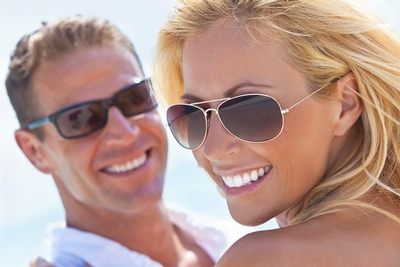Do You Need Polarized Sunglasses?
- BY Ryan
- IN Sunglasses
What The Heck Are Polarized Sunglasses?
Designed to reduce the glare caused by sunlight reflecting off of surfaces such as water, snow and glass windshields, polarized lenses can prevent a lessening of visibility. For this reason, polarized sunglasses can offer an increased level of safety over regular summer shades. Regular sunglasses dim the overall light, but don’t reduce reflective surface glare that can block your perception of important details during activities like boating, skiing and driving.

Polarization is a property of light which basically involves light waves moving off of a surface. Since the light waves mostly move horizontally, polarized sunglasses lenses are treated vertically with polarizing film to counteract the resulting glare. Polarized sunnies are available in many fabulous frames and an array of fun, colored tints. This eyewear varies in its degree of tinting and the different colors work with light differently depending on the main surface color.
Remember though that just because sunglasses are tinted, it doesn’t mean that they have polarizing lenses. The label should always indicate that you are buying polarized eyewear. Here’s a quick guide to the best polarizing film tints for different activities:
Polarized Sunglasses Tints Matched To Outdoor Activities
***Violet or Rose — boating, fishing, water skiing, golf
***Green — baseball, tennis
***Dark Gray — driving, boating
***Yellow — skiing, snow boarding
***Brown or Amber — all purpose, golf, biking, jogging
Who Should Wear Polarized Sunglasses?
If you drive, boat, snow ski, water ski, fish, golf or bike or play baseball or tennis, you should consider getting a pair of polarized sunglasses for safety reasons alone. When driving on a sunny day, the glaring sun can block out a large portion of the road ahead as far as your vision is concerned as the sunlight reflects off of the windshield. This glare effect can also occur on a ski slope causing you to have a higher risk of not seeing obstacles in your path. The same goes for seeing details clearly during water activities such as fishing, water skiing or boating — no more of the lake looking like a giant mirror!

Polarized sunglasses may also be right for you f you have light sensitivity issues or are facing the after effects of cataract surgery. Discussing whether polarized sunnies could be an option for you with your eye care professional can be a good idea.
What Should I Look For In Polarized Eyewear?
Look for ultraviolet (UV) protective polarized lenses to protect your eyes against sun damage. If the safety concern isn’t enough for you, consider the comfort of experiencing less pain of having bright sunlight in your eyes and an increased perception that can help you better enjoy playing in that weekend baseball game, tennis match or golf championship. You choose the tint that will offer you the best contrast with the main background color of your environment. (Refer to the color guide above.) The degree of contrast, plus the glare reducing effect, can help give you maximum visibility on a bright, sunny day.
You may even be able to perform better as an added bonus like actually being able to see the golf or tennis ball more clearly through the glaring sun. Plus, polarized sunnies are typically lightweight, with thin lenses, so they aren’t going to bulk you down.
A Passion For Fashion
Playing with different colors of polarized lenses to set off different summer outfits can be fashionista fun for sure. For example, Oakley has some 2012 polarized sunglasses in lime green and purple, while Neff is offering yellow polarizing lenses in white frames. There are many more color possibilities that can wake up any summer look while also protecting the eyes. Bring on summer!